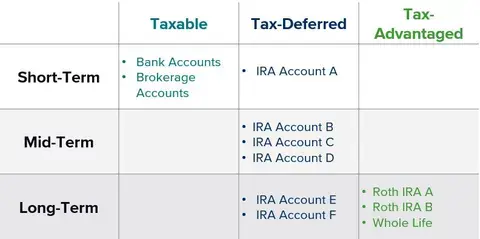During your working years, you typically have a good sense of how much you’ll earn each month. This allows you to fairly accurately forecast, based on your budget, how much cash flow you need to pay your bills and, hopefully, have some leftover to save for the future.
Once you retire, your monthly income can become harder to predict. Market volatility, inflation, public policy changes and fluctuating expenses are just some of the factors that will dictate how much you’re able to withdraw from your savings or receive from Social Security benefits each month.
This raises an important question: How do you estimate how much monthly retirement income (your “retirement paycheck”) you’ll have? Predicting how much retirement income you can expect to have can be complex, but the final answer ultimately relies on evaluating these four things:
1. Analysis of Current Assets
The cornerstone of retirement income planning is likely to hinge upon the amount you’re able to save on your own. When Wealth Enhancement Group advisors project retirement cash flow with our clients, we allocate assets based on your time horizon, with lower risk assets in your short-term bucket and more volatile assets with greater upside potential in your long-term bucket.
We also analyze assets based on their tax status (immediately taxable, tax-deferred and tax-advantaged). By breaking down our clients’ assets in such detail, we’re better able to estimate “safe” withdrawal amounts so that they don’t run out of money in retirement and determine the potential tax implications they’ll face when generating retirement income off their nest egg.
FIGURE 1: Allocating Assets by Tax Treatment and Time Horizon

2. Forecast of Potential Growth
Depending on how long it is until your planned retirement date, you may have the opportunity to boost your nest egg before retiring. Part of that increase may come from gains in the markets, but it may also come from continuing to save during your working years. Once you turn 50, contribution limits to your IRA and 401(k) increase to $7,000 and $26,000, respectively.
Estimating how much you’ll earn on your investments is more complex and largely depends on your asset allocation. It’s important to note that even if the markets have a down year, you won’t have to realize those losses if you have enough money in your short-term bucket to pay for your living expenses.
3. Estimated Social Security Benefits
As a general rule, the longer you wait to receive Social Security, the higher your monthly benefit will be, although you’ll be receiving those higher benefits for a shorter period of time. Whether you should claim at a younger age versus delaying benefits depends on a number of factors, including if there’s an immediate need for benefits, the age you want to retire and your desire to postpone spending down your personal savings. For those who are eligible to claim off of a spouse's (or former spouse’s) earnings record, estimating your lifetime benefits becomes significantly more complex, and the potential financial benefits of planning prior to filing is magnified.
4. Projection of Future Taxes
The first three topics we’ve discussed all entail factors that estimate the amount of income you’re able to generate in retirement. But just as there are taxes withheld from your regular paycheck, you’ll also have to pay taxes on a portion of your retirement paycheck. Fortunately, there’s a good chance your tax burden will decrease in retirement, which may make converting some of your tax-deferred dollars to a Roth IRA an attractive option. Not only are your Roth dollars tax-free (assuming withdrawals are made without penalty), they’re also exempt from required minimum distributions (RMDs) after you turn 72.
Keep in mind that Traditional IRA account owners should consider the tax ramifications, their age and income restrictions when executing a conversion from a Traditional IRA to a Roth IRA. The converted amount is generally subject to income taxation.
Estimating Your Retirement Paycheck is Complex
The process of estimating your retirement paycheck isn’t an exact science, nor is the final calculation likely something that you can set in stone. However, taking the time to work with a financial professional to predict how much retirement income you can expect to have goes a long way toward identifying whether you’re on track with your current financial plan.
At Wealth Enhancement Group, we’ve built a software-based tool we call RealityCheck™ to estimate how much monthly income you might expect from your retirement portfolio. It translates your unique circumstances and abstract investment statistics into a real-world projection of how much you could expect to live on. We'll crunch the numbers, prepare the RealityCheck™ report, and go over it with you in detail.
This information is not intended to be a substitute for specific individualized tax advice. We suggest that you discuss your specific tax issues with a qualified tax advisor.
Asset allocation does not ensure a profit or protect against a loss.




